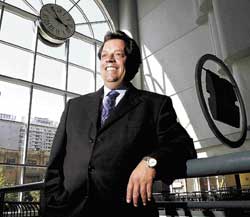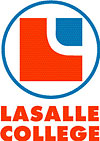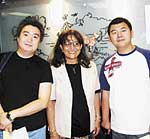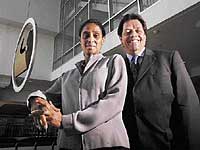
The Montreal Gazette, July 30, 2003
LaSalle College emphasizes preparation of its students for competitive job market
By Warren Perley
 PHOTO: PHIL CARPENTERJacques Marchand, general manager of LaSalle College, puts the emphasis on finding good jobs for his students. LaSalle College offers all its graduates worldwide a lifetime job-placement service free of charge.
PHOTO: PHIL CARPENTERJacques Marchand, general manager of LaSalle College, puts the emphasis on finding good jobs for his students. LaSalle College offers all its graduates worldwide a lifetime job-placement service free of charge.Jacques Marchand, general manager of LaSalle College, judges the value of a good education by his students’ ability to land a job after graduation. LaSalle College - the largest private bilingual technical college in Canada - prides itself on preparing its 4,000 full-time students for the job market.
"We’re not here just to educate the students," Marchand said in a recent interview. "We have to imbue our students with the attitudes, values and communication skills needed for their professions. Employers consistently tell us that when our students arrive for job interviews, they come with the right attitude and skills."
Students from approximately 50 different countries attend classes at LaSalle. Besides its campuses in Montreal, Toronto and Vancouver, LaSalle started opening campuses in foreign countries 14 years ago under the banner of LaSalle College International.

At present, there are 22 foreign campuses in places such as Morocco, Singapore, Kuala Lumpur, Shanghai, Jakarta, Manila, Tunisia, Bogota and Istanbul, with the most recent affiliate opening in China.
Of their 3,500 full-time students in Montreal, 50 per cent are adults and 50 per cent are teenagers. About 90 per cent are Canadian and 10 per cent are foreigners, some of whom pay up to $12,000 a year in tuition fees. Canadians, who are subsidized by the Quebec government, pay about $3,000 annually. Courses taught at the Montreal campus are split about 50/50 between the English and French languages.
LaSalle offers all its graduates worldwide a lifetime job-placement service free of charge through its agency, called Zoom. Soumaya Akiki was director of Zoom for 10 years before taking over recently as co-ordinator of the hotel management and tourism program at LaSalle College.
"We have one job-placement counsellor for each program we teach," she said in an interview. "Each one of our five counsellors has between 80 and 100 students visiting him or her for consultations each month."
Accessibility is a recurrent theme in conversations with all members of the administration, starting with Marchand, who prides himself on being available to all his students as he strolls the hallways daily, exchanging pleasantries.
Counsellors work with studentsFor Akiki, accessibility means having the job-placement counsellors available to the students whenever the need arises, as well as being available to speak to potential employers on a regular basis.
"When dealing with the students, our biggest challenge is to encourage them to persist in their studies and to obtain their diplomas," she said.
 PHOTO: COURTESY OF LASALLE COLLEGELaSalle College’s Soumaya Akiki, former long-time head of job placement services, is shown welcoming two new Chinese students, Shen Lewe (left) and Quan Lu (right).
PHOTO: COURTESY OF LASALLE COLLEGELaSalle College’s Soumaya Akiki, former long-time head of job placement services, is shown welcoming two new Chinese students, Shen Lewe (left) and Quan Lu (right)."On the employer side, we make sure that we listen carefully to their needs so that we can match them up with the right graduate. We pride ourselves on returning phone messages the same day and getting student CVs into their hands in a hurry. We also have weekly follow-ups with employers who hire our students to ensure that things are working out."
The most important factors in successful job placements are to give good customer service and to project a professional attitude, says Akiki. "I talked to my counsellors weekly about the importance of problem-solving and teamwork on behalf of both the students and the employers."
The statistics show a high level of success in finding jobs for LaSalle College graduates. In 2002, Zoom found jobs for 89 per cent of its 750 graduates. Not only found them jobs, but actually gave them a choice of jobs, since those 750 graduates received 1,414 job offers.
Job-placement counsellors work the phones, calling potential employers to remind them to contact LaSalle College before placing ads in the newspapers. With more than 40 years of history, LaSalle College has built a solid and enduring relationship with major companies, many of whom have LaSalle graduates on their staffs.
The Queen Elizabeth Hotel is one of those companies. Diane Groulx, who works in the hotel’s human-resources department, agrees with Marchand that his graduates have more than just book knowledge.
Groulx calls it "savoir faire," that ability to know how to present oneself and how to make the appropriate comment at the right time.
"Being able to interact with clients is essential in the tourism industry," Groulx said, adding that LaSalle College graduates also have great training and are bilingual - many even trilingual.
Peter Zver, president and CEO of PensEra Knowledge Technologies Inc., says he hires LaSalle College graduates because they are conversant with the computer technology used by his company, a software development and consulting firm which specializes in building portal solutions and knowledge tools for the legal profession. "They’re at ease with our technical strategy, which to me means that they’re already playing a productive role taking account of our needs," Zver said.
Students don’t have to wait until they have graduated in order to take advantage of LaSalle College’s job-placement services. There are summer-employment and apprenticeship programs available to all students.
To strengthen their connections with employers, the college gets involved in joint projects such as one-day fashion shows put on in conjunction with local apparel manufacturers.
Occasional fashion shows are part of the "joie de vivre" ambience a visitor notes immediately upon entering the hallway of the massive college-owned 350,000-square-foot building at 2000 Ste. Catherine St. W. near Fort.
The Montreal campus remains the international headquarters of this worldwide network, as well as the major source of its revenue. Its roots run deep in the local community, starting in 1959 as a business college founded in the suburb of LaSalle by entrepreneur Jean-Paul Morin. Its only offering at the time was a one-year secretarial program.
Within a few years, Morin had moved the campus to Drummond St. near de Maisonneuve Blvd. and had expanded the courses to include a three-year program in secretarial courses.
 PHOTO: PHIL CARPENTERJacques Marchand, general manager, and Susan Levy Riches, admissions director, believe that accessibility and empowerment of staff at LaSalle College work to the advantage of students, who are referred to as "clients."
PHOTO: PHIL CARPENTERJacques Marchand, general manager, and Susan Levy Riches, admissions director, believe that accessibility and empowerment of staff at LaSalle College work to the advantage of students, who are referred to as "clients."Marchand, then a 29-year-old consultant in management training at the Université de Montréal’s business faculty, known as the École des Hautes Études Commerciales (HEC), joined the college in December 1979.
Within a short time, Marchand had added courses such as hotel management, tourism, as well as fashion design, production and merchandizing. As of this year, LaSalle College Group offers complete diploma programs in the following fields:
He wrote the advertising copy which appeared in newspapers and flyers himself. One of his earliest ads read: “When you specify Frosst for pharmaceuticals, you support Canadian industry and receive right quality for right prices.”
- Fashion - design, marketing and production;
- Hotel management, food service and tourism;
- Business administration - commercial management, accounting and management, transportation logistics;
- Computer science - programming analysis, data management and network management;
- Digital imagery - print media advertising, interactive CD-ROM, new media and Web-site design, 2-D and 3-D animation, video editing, commercial and digital photo, video-game conception;
- Design - interior, display and set;
- Beauty - aesthetic care, electrolysis, hairdressing and artistic makeup;
- Languages - English or French as a second language with TOEFL, TOEIC and TFI test preparation;
- Online training with their Web portal (www.ilasallecampus.com);
- Industry training and software for garment manufacturers.
By 1985, enrolment of full-time students, ranging in age from 17 to 21, had increased to 2,400 from 1,000. Marchand added night courses, attracting 600 more adult students who held down jobs during the day.
When Morin retired in 1987, a new management team was put together under the leadership of an ex-petroleum executive, Jacques A. Lefebvre, who left as executive vice-president of the Quebec government’s Société genérale de financement to head LaSalle. Marchand kept his role as general manager of LaSalle College and became vice-president of LaSalle College Group, becoming Lefebvre’s partner.
Lefebvre, the president of LaSalle College Group, is also the founder of the Montreal Fashion Foundation (Fondation de la mode de Montréal) which has donated more than $1.25 million to 75 college and university-level graduates over the last 13 years for apprenticeships in industry or post-graduate study programs abroad.
LaSalle’s three-year fashion program entails design, marketing and production. LaSalle is among the biggest fashion schools in the world.
"These funds allow local fashion students to perfect their studies abroad and to then raise the level of expertise in Montreal," Marchand says proudly. "We, at LaSalle, want to do our part to make Montreal an international capital of fashion."
To offset the falling birthrate at home, Lefebvre and Marchand launched LaSalle College International, which, with the help of the Canadian International Development Agency, set up campuses abroad. In Quebec, they lobbied the Quebec government to receive the same educational recognition as public CEGEPs as well as subsidies, which allow Canadian-born students to pay a lower tuition than foreign pupils.
At LaSalle campuses in Asia, most of the courses are taught in English. At African campuses it is mostly French, while the language of instruction is Spanish at LaSalle campuses in South America.
Problem-solving is keyThe emphasis on close working relationships among job counsellors, students and employers extends to every aspect of the college, including its department of admissions. Admissions director Susan Levy Riches, who joined the college from private industry nine months ago, emphasizes problem-solving and empowerment for her staff of 14 counsellors.
Levy Riches, educated in England, France, Switzerland and Africa, feels comfortable in the college’s cosmopolitan environment. She encourages her counsellors to solve problems directly by trying to understand the needs of potential students, many of whom come from abroad and need help adapting to the social customs of their new homes.
One of her counsellors is David-Simon Boisvert, 29, who graduated recently from LaSalle College’s production-management program. Boisvert, who comes from Chambly, says he was attracted to LaSalle College by its international aspect and its location in the heart of the downtown district.
"When I graduated, I walked out of here with friends from around the world," he said in an interview. "That aspect is unique to LaSalle. The quality of the teachers was also a big plus."
Boisvert, who had worked in the wholesale end of the fashion industry, decided to return to school several years ago to learn how to set up production lines and quality-control procedures.
The fact that a lot of teachers at LaSalle College are still active in their professions helped Boisvert make contacts and receive many job offers when he graduated in 2002.
An only child whose dad worked in management for NavCan and whose mother used to work in a day-care centre, Boisvert decided to stay with his surrogate family at LaSalle College, accepting a job offer with the Centre for Fashion Technology.
He recently transferred to work with Levy Riches in the admissions department, where he co-ordinates special events.
When talking with school administrators such as Marchand and Levy Riches, it’s interesting to note their use of the word "clients" when referring to their students. Unlike public CEGEPs, this is a privately-run industry which knows that it has to stay on its toes to be "efficient and profitable," said Marchand.
That means a heavy investment in infrastructure - top-of-the-line computers, highly motivated and qualified instructors, as well as access to immaculately clean laboratories 24 hours a day, seven days a week.
Falling birthrates in Canada mean that LaSalle has to promote its message internationally in order to attract students to both its Canadian campuses and its foreign ones. It has a full-time public relations and advertising agency called Maxxum, which takes care of putting together the slick presentation materials used worldwide to explain the advantages of attending LaSalle.
Unlike some universities and CEGEPs where there are tensions among students of different ethnic backgrounds, students interviewed said there is no political or ethnic antagonism at LaSalle College.
Three students interviewed for this article - one from Asia, one from South America and one from the Middle East - all confirmed the "melting-pot" environment at LaSalle College which allows education to be such an enjoyable social experience.
Zhang Chang comes from Beijing, China, and is studying tourism. Lorena Benedetto Perez is a native of Caracas, Venezuela, and is in the intensive English-language program. Yaser Amro immigrated to Canada six years ago from Hebron on the West Bank of Israel.
Amro, 32, who graduated in 2001 from an intensive one-year computer program, wants to become a network administrator. After graduating, he was hired by LaSalle College for technical support in its computer department. He plans to continue studying computer science at the university level in the coming years.
"The education at LaSalle College was an excellent first step in my field of study," he said. "It’s also a very interesting place to study because of its multicultural nature."
When Amro started the course, he knew nothing about computers. He attributes his quick progress to dedicated teachers such as Andrew Golden, who give out their home numbers to students who need help outside the classroom.
He cites the spontaneity and comradeship outside the classroom as an added inducement to studying at LaSalle College. "There is always someone to talk to or to assist you here," he said.
Amro, who has six sisters and five brothers still living on the family farm in Hebron, says he came to study in Canada because of its peaceful reputation. He married his childhood sweetheart, Ramia, one month ago in Hebron and she has joined him in Montreal, where she’ll be studying for her master’s degree in economics.
Perez, in her early 20s, says she only knew the words "hello" and goodbye" when she arrived at LaSalle College 14 months ago. Judging by the fluency and frequency of her comments during our recent interview, it would seem that she is a fast learner.
Perez comes from a well-to-do family - her father, Carmelo José, is a surgeon who specializes in urology, and her mother, Giomas, is a psychologist. In Venezuela, she has a brother studying to be a doctor and a sister who is in architectural studies.
For Perez, studying is as much about the social aspect, as the educational side of things. "I love the language centre," she said, "because we study in small groups and we get together for outings and trips outside the classroom to learn English. Everyone, including the teachers, takes part in the social activities."
Activities include picnics, soccer games, visits to the museum, and to outdoor markets such as the one at Atwater Ave.
"It’s a great way to learn a language," Perez said. "You learn the theory of grammar and then you practise with friends you made in the classroom. It’s incredible."
Comparing costsBefore choosing to study at LaSalle College, Perez did a comparative review of what it would cost to take similar courses in what she calls the three best countries in the world to study English: Canada, the U.S. and England. The cost for a three-month stay in a private college near Chicago would have been $8,000 U.S., compared with $9,000 U.S. for four months in England and $5,000 Canadian for four months in Montreal. All her comparisons included the cost of the courses, textbooks and staying in residence. Food costs were not included.
 PHOTO: PHIL CARPENTERLaSalle College attracts students from around the world (right to left): Zhang Chang of Beijing; Lorena Benedetto Perez of Caracas; and Yaser Amro of Hebron on the West Bank of Israel. They are joined by recent graduate David-Simon Boisvert of Chambly, who now works in LaSalle’s admissions office.
PHOTO: PHIL CARPENTERLaSalle College attracts students from around the world (right to left): Zhang Chang of Beijing; Lorena Benedetto Perez of Caracas; and Yaser Amro of Hebron on the West Bank of Israel. They are joined by recent graduate David-Simon Boisvert of Chambly, who now works in LaSalle’s admissions office."What I really like at LaSalle College is the way teachers and administrators help foreign students face the cultural challenges of adapting to a new environment. They really take care of us. They make sure that we receive the right information about the courses we need to take and about our living arrangements. And all our teachers make sure we spend our time well in class so that we accomplish what we came here for."
Zhang is an only child whose parents live in Beijing. Her father teaches physics at the university there and her mother works at the same university, taking care of retirement benefits.
Prior to coming to Canada two years ago, Zhang studied in Japan for six years. She says her parents encouraged her to study there because it was closer to home than North America. But English-speaking countries, especially in the tourism field, are the prime destination for Chinese students, she said.
"I love travelling," Zhang said. "Until now, I’ve only seen the eastern world. Now I have a chance to travel in the West. I’d like to find a job in tourism in Canada or work as a tour operator."
There is also the possibility of returning to China, where the travel market is growing quickly. "More and more Chinese want to travel abroad," she said. "They need professionals to help them plan their voyages."
When asked why she chose to study at LaSalle College instead of at a U.S. college, she replied: "For Chinese people, Canada is considered to be safer to live than the U.S. It’s peaceful and multicultural here."
To play up the multicultural advantages of studying in Montreal, LaSalle College International publishes a booklet which explains to foreign students the advantages of studying at its Montreal campus - playing, de facto, the role of goodwill ambassador on behalf of the city and province.
There is help available through the college’s databank for foreign students who need reasonably-priced housing. Social and sporting activities are organized to help integrate foreign students with their Canadian colleagues. The college will even send a representative to the airport to meet new arrivals and to drive them to their accommodations.
Supports community causes"We do more than just give college courses," Marchand said. "We’ve learned to diversify. We have to look for students outside Canada who want to study here. At the same time, we want to export our expertise to other countries through our branches abroad."
In line with efforts to spread its reputation abroad, LaSalle started online long-distance educational courses last year.
Apart from its teaching mandate, Marchand says LaSalle is proud to promote Montreal around the world as a centre of educational excellence and a peaceful haven from the urban violence which afflicts so many large cities.
"We’re a career college, but part of our mandate is to develop roots in the community and to support good causes," he said.
Among other fundraisers, LaSalle gets involved in the Easter Seal campaign and solicits on behalf of Ste. Justine Hospital. It organizes an annual fashion show to raise funds for the Farah Foundation for AIDS research. In fact, each department in the college chooses the charities it wishes to help.
In addition to the social causes it espouses and its stimulating learning environment, Marchand summarizes the advantages of studying at LaSalle as follows:
- A unique educational and social support structure for students;
- An internationally recognized diploma;
- A network of contacts across Canada and throughout the world;
- A teaching approach based on the integration of new technologies;
- Partnerships with industry and university leaders.
"When students study at LaSalle College, we take care of more than their education," Marchand said. "Teaching is about more than just book knowledge. It’s about values and communicating."
Warren Perley, a former career journalist, is president of Ponctuation Grafix, a marketing and graphic design studio (www.ponctuation.com).